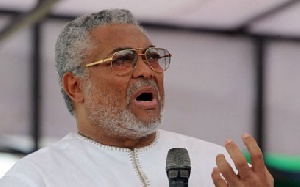Long before the creation of the main opposition National Democratic Congress (NDC), the widely acclaimed and prematurely glorified founder of the NDC, a career coup-plotter, had created another political machine with his clansmen and other opportunistic non-Ewe associates called the Provisional National Defense Council (PNDC), a veritable military junta intended to radically and decisively suppress the power and influence of the Akan-Ghanaian ethnic majority, particularly the Asante. Of course, as we are all aware, in the eyes of the average Ewe, there are absolutely no distinctions among Akans. We are all classified as “Bluto,” whatever such designation means and for whatever this most-hated label may be worth.
We make the preceding observation because there is a very poorly composed and edited article on several Ghanaian media websites titled “Youth Group Rejects Plans to Create New Region from Volta,” whose authors call themselves Concerned Volta Youth (CVY).
Needless to say, whenever one comes across any press release with its authorship prefixed by the political adjective of “concerned,” one can almost be certain that such release was not composed by more than three self-appointed spokespersons for the perceived or loosely identifiable opponents of any proposed project. In this instance, the project has to do with the electioneering campaign proposal, first publicly floated by then-Candidate Addo Dankwa Akufo-Addo, regarding the creation of an additional 4 regions in the country, in a bid to expediting the New Patriotic Party-championed decentralization process.
We use the name of the Anlo-Ewe political godfather, Chairman Jerry John Rawlings, in this column because it was the former Flt.-Lt. Rawlings who caused the splitting up of the erstwhile Upper Region into the present-day Upper-East and Upper-West regions. Technically, until 1982, or thereabouts, when its separation was officially announced by Chairman Rawlings, the Greater-Accra Region was still a part of the Eastern Region, even though the original process of separation, began by the Nkrumah-led Convention People’s Party (CPP) regime, if memory serves yours truly accurately, had statutorily or legally kicked into effect by 1967, in the immediate wake of the military overthrow of Life-President Kwame Nkrumah.
Now, I know a diddly little about the ethnic/tribal issues that had to be resolved or overcome in order for Chairman Rawlings to be able to split the erstwhile Upper-Region into the Upper-East and Upper-West regions. Very likely, it was President Nkrumah, the man who strategically split the Brong-Ahafo Region, formerly known as Western Asante (Ashanti), from the Asante Region, who also created the former Upper Region. Now, we can debate the question of whether the demarcation of the country into 10 major administrative regions have served the purposes for which they were created or not. But that is not the focus of the present column.
Rather, the focus of this article verges on the reason or aim given by the so-called Concerned Volta Youth for being vehemently opposed to President Akufo-Addo’s proposed decision of splitting the present-day Volta Region into the Volta and Oti regions, in addition to the proposed splitting up of the Brong-Ahafo Region into the Brong and Ahafo regions; and the present-day Western Region into Western and Western-North regions.
We must also quickly point out the fact that had former President John Dramani Mahama and his National Democratic Congress (NDC), the party whose cause the so-called Concerned Volta Youth claims to be staunchly engaged, not lost the December 2016 general election, Mr. Mahama would have been supervising the creation of 5 additional regions, and not 4, as proposed by President Akufo-Addo.
Now, vis-à-vis the question of whether merely splitting up the country into more regions has brought about any remarkable enhancement in the general level of the country’s development, the Concerned Volta Youth may be seen to be on the same page as yours truly.
It is on the question of whether the re-demarcation of the country into more regions ought to be predicated on the political agenda and fortunes of the National Democratic Congress on which we irreconcilably part ways. It is also the fundamental basis on which the protest motive of the Concerned Volta Youth can be legitimately be held suspect.
Opinions of Thursday, 26 January 2017
Columnist: Okoampa-Ahoofe, Kwame















